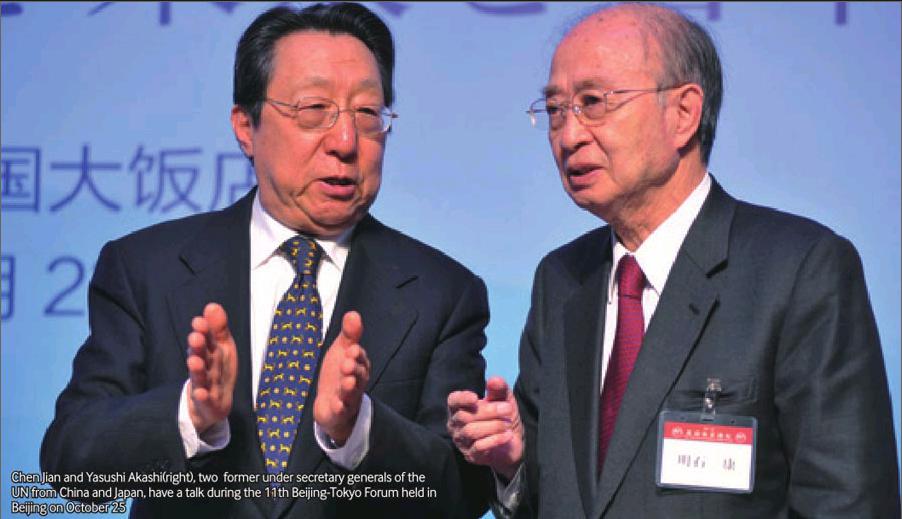A Dialogue Between Two Nations
2015-12-01

In East Asia, the China-Japan relationship is both special and complicated. The potential for the two countries to work together on economic and technology matters, along with cultural exchanges, is great. However, the two nations remain at odds over historical issues and territorial disputes.
“The Sino-Japanese relationship is like a delicate plant whose cultivation needs lots of care and it might be ruined by a sudden storm,”said Zhao Qizheng, former Minister of the State Council Information Office (SCIO) when speaking at the opening ceremony of the 11th Beijing-Tokyo Forum in Beijing on October 24.
The Beijing-Tokyo Forum has been committed to promoting Sino-Japanese relations through people-to-people contact since 2005. The recent event was co-hosted by China International Publishing Group (CIPG) and the Japanese nonprofit think tank Genron NPO.
However, it is not easy to improve bilateral relations.
“Tensions between China and Japan are far from over,” former Japanese Prime Minister Yasuo Fukuda said during the opening ceremony.
The latest opinion survey conducted by CIPG and Genron NPO in China and Japan between August and September revealed 80 percent of respondents still had a negative view of each others country, though it was a slight improvement with previous years.
“It has been unusual for the two peoples to hold negative views against each other for such a long time. I am very concerned about this,”Fukuda said.
“In the face of various global challenges, Japan and China should stop looking at each other with hatred. Instead, we should work together for a more prosperous Asia,” he added.
Jiang Jianguo, Minister of Chinas SCIO, said in his keynote speech, “We need to extend cooperation and promote people-to-people exchanges to improve Sino-Japanese relations.”
The discussions between Chinese and Japanese delegates focused on politics, economic affairs, security, the media and culture.
Security concerns
A candid dialogue, with pointed arguments, occurred during the discussion on security issues.
With regard to Japans newly approved security bills, Yasushi Akashi, the former Under Secretary-General of the UN, said the belief in peace had deeply taken root in Japan since the end of World War II (WWII). However, he said it is necessary for Japan to readjust its defense policy owing to changing security situations.
“Japan needs to keep an appropriate military strength to defend itself. That is the proactive pacifism that Prime Minister Shinzo Abe is pursuing,” Akashi said.
Chen Jian, Chinas former UN under secretary-general, responded by saying that Japan considers China a strategic adversary and that is why Abes foreign policy always targets China. “This will greatly affect SinoJapanese relations,” Chen said.
Ken Jimbo, an associate professor at Keio University, admitted that Chinas rapid rise is a major factor which helps fast-track the new security bills in Japan.
“But if both sides can control tensions on disputed waters, the new security bills might well serve as a foundation for Japan to participate in security cooperation with other countries, including China, in Asia and the world,” Jimbo told Beijing Review.
Chinese President Xi Jinping and Abe agreed to establish a crisis management mechanism during their meeting last year in Beijing, according to Jimbo.
In March, China and Japan resumed a dialogue on security, which was suspended four years ago, and the two sides agreed to build maritime and air liaison mechanisms.
Yoji Koda, a former vice-admiral of the Japan Maritime Self-Defense Force, told Beijing Review that two key points would solve Chinas concern over Japans new security bills.
“It depends on whether the Japanese Government can provide an explicit explanation for the Chinese Government and whether China can understand Japans security bills correctly,” Koda said. In Kodas view, the Japanese Government failed to explain the essence of the bills to the Chinese public.
Wu Jianmin, a counselor of the Foreign Policy Advisory Committee of Chinas Ministry of Foreign Affairs, stated that the tensions in bilateral relations were mostly triggered by Japans unilateral actions on sensitive issues.
As a veteran Chinese ambassador, Wu suggested Japan and China should improve relations by working closely on efforts to promote regional development, such as the China-proposed Asian Infrastructure Investment Bank (AIIB).
“Many European countries have joined the AIIB, why would Japan keep rejecting the new multilateral lender?” asked Wei Jianguo, a former Vice Minister of Chinas Ministry of Commerce.
Counselor Wu said Sino-Japanese relations will not improve if Japan chooses to follow the U.S. strategy to “contain” China in Asia.
Historical issues
Chinese delegates criticized Abes remarks on the 70th anniversary of the end of WWII, saying he did not clearly express recognition of Japanese aggression and war crimes or apologize for them.

Yang Bojiang, Deputy Director of the Institute of Japanese Studies at the Chinese Academy of Social Sciences, said Abes statement was like a “cup of watered-down coffee.”Abe avoided talking about his countrys crimes in WWII, but tried to justify Japans right to have more powerful military forces and take military action in any region around the world.
Akashi said the truth of history could not be denied. Japanese politicians should view historical issues with decency.
“Some Japanese politicians and scholars always argue over the number of victims during the Nanjing Massacre. In my opinion, it doesnt matter how many people died, what matters is that the crime was indeed committed,” he said.
Nanjing Massacre documents were inscribed into the UNESCOs Memory of the World Register on October 9, a move that gives international recognition and consensus of records. In recent years, right-wing factions in Japan have distorted the massacre.
Subsequently, the Japanese Government lodged a protest against the inscription and threatening to withdraw its donation to UNESCO.
“The Japanese Governments response was ridiculous. It reflects Abe administrations historical revisionism again. The evidence of the Nanjing Massacre is irrefutable,” said Tang Chongnan, President of China Society of Sino- Japanese Relations History.
Akashi suggested the Japanese Government move the memorial tablets of Class A war criminals out of the Yasukuni Shrine, which would stop controversy over Japanese officials paying visits to the shrine.
“It is never too late to take responsibility. Only by doing this can Japan build a promising future with China and other neighboring countries,” said Yuji Yamamoto, a Liberal Democratic Party representative of the lower house of the National Diet of Japan.
Zhang Lili, a professor of Japan studies at China Foreign Affairs University, told Beijing Review that he is cautiously optimistic about China-Japan relations and that it will be hard for the two countries to reconcile if history issues cannot be treated properly by the Japanese side.
Big economic potential
Whereas political and security issues formed a hot debate, the delegates from both sides had more in common with regard to economics.
“China is making an effort to transform its economic development model, which engenders enormous cooperation opportunities between Chinese and Japanese companies,”said former Vice Commerce Minister Wei.
China needs to learn from Japans advanced experience on matters such as attaining a green economy, enhancing environmental protec- tion, developing modern agriculture and many more, Wei said.
“China is promoting the Silk Road Economic Belt and the 21st-Century Maritime Silk Road Initiatives with countries that might have an interest. Some Japanese investors have asked me whether they are allowed to share the opportunities, I told them the answer is absolutely yes,”Wei said. “Japan should join hands with China to promote Asias common development.”
Yamamoto said China is playing an increasingly important role in the world economy. A prosperous China is an opportunity for both Japan and the world.
As for Chinas effort to include its currency in the Special Drawing Right (SDR) of the IMF, Yamamoto said, “I believe the yuan deserves to be a reserve currency.” The RMB has overtaken Japans yen to become the fourth-most-used world currency this August.
“If China and Japan can work together to build a common market with South Korea and the Association of Southeast Asian Nations, Asias economic integration will benefit a population of 3 billion. Asia will lead the world in economic expansion once again,” Yamamoto concluded.
